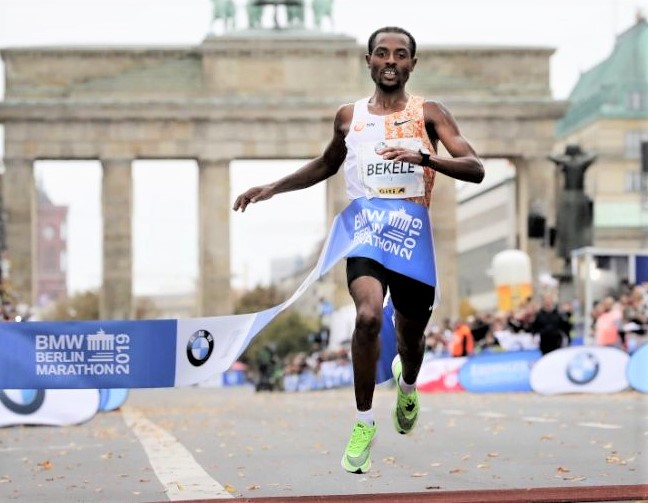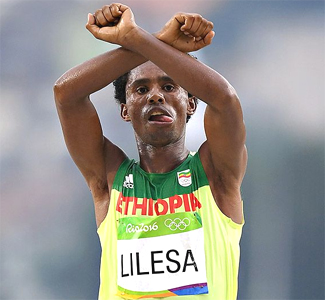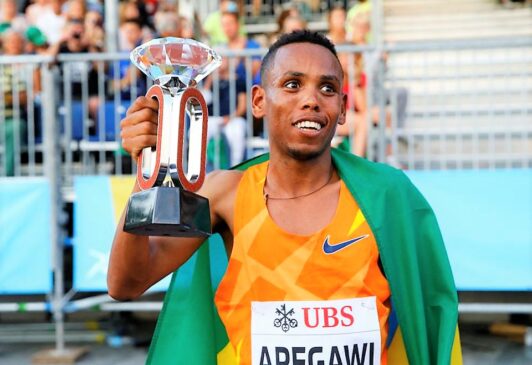Kenenisa Bekele’s Berlin Marathon heroics Clearly Demonstrate his mental prowess more than anything

By Zecharias Zelalem.
His is always one of the first names brought up when athletics is discussed by anyone with a basic familiarity with excellence on the track. And rightfully so, even among accomplished athletes, few boast a palmares that compares with the Ethiopian long distance runner’s. Three Olympic titles, five World Championship wins and over a dozen more crowns conquered in elite international cross country and marathon competition, Kenenisa Bekele’s legacy as a global beater, as one of the most accomplished sportsmen in history was sealed long before turned 30. But today, now on the cusp of 40, he secured an awe-inspiring Berlin Marathon win. His victory in Berlin today proved not only his long & renown athletic ability but also showed his incredible resilience and mental fortitude to bounce back from setbacks that would typically end one’s career.
Battling with fellow countrymen Birhanu Legese and Sisay Lemma, who are a decade younger than him, the legendary athlete recovered from a surge in pace by Birhanu with just over 10 km to go, to overtake him and open up what ended up as an unassailable lead over the field with 5km to go. It was Kenenisa vs Eliud Kipchoge, as the Ethiopian had no obstacles to maneuver and sought to smash the Kenyan marathon runner’s world record set a year ago. He gave it his all, clenching his teeth as he charged towards the finish line, grimacing from the pain of forcing his body to deliver a last final burst of speed after nearly 42 km of running, he fell an agonizing two seconds short of the world record. A staggering 2:01:41 that saw him run the second fastest time in history and come in over a minute earlier than second place compatriot Birhanu Legese. Kenenisa was apologetic afterwards.
“I am very sorry. I am not lucky,” he said referring to his near miss. “But I still can do this. I don’t give up.”
His was an amazing triumph against the odds. The race wasn’t expected to yield record breaking performances. With Eliud Kipchoge choosing to forego this race to train for an attempted stratospheric sub 2 hour run in Austria next month, Berlin was considered an attempt by Birhanu Legese to draw level with Kipchoge in the World Marathon Majors seasonal rankings. It was also deemed a platform for some up and comers to announce their arrival on the world stage with an eye on earning a spot on respective national teams for next years 2020 Olympic Marathon. For Kenenisa Bekele, who has struggled in recent years with a chronic inability to avoid pulling up lame, it would have been a feat to simply complete the course. He hasn’t won a marathon since 2016 and has failed to finish two of his last three marathons, dating back to his dropping out of the same Berlin Marathon course, back in 2017. For race organizers, Kenenisa’s presence may have been a way of selling the race and attracting onlookers. With his advancing age and his injuries well known, the idea of Kenenisa challenging this year’s Berlin Marathon field, may have become a mere afterthought.
Since making the transition from track to road races, Kenenisa Bekele has seen his reputation as an invincible and ruthless finisher falter. A series of injuries, including multiple calf muscle tears and fractures around the knee put him out of action for almost two years between 2009 and 2011. They are what effectively ended his track career. Kenenisa’s transition has been far from seamless. Injuries had him dropping out of races in increased frequency. Talk of his retirement from the sport became a topic amongst Ethiopian sports pundits, especially as he approached the heavier side of his thirties. Another pundit, citing the experiences of sporting legends such as basketball great Michael Jordan, suggested he should have quit while he was ahead. Despite this, the odd flash of brilliance every now and then reminded everyone that he could still deliver. On his day, he was still among the finest marathon runners in the world. His 2013 Great North Run half marathon victory over Mo Farah in Newcastle England, which saw him remain firm despite a finish line dash from the Briton that had him nearly overtaken with some 200 meters to go, will come to mind. But, these performances were few and far between and came between long injured stints on the sidelines.
For Kenenisa, this inconsistency resulted in the heartbreak of his athletics career when in 2016, he was dropped from Ethiopian national team consideration ahead of the Rio de Janeiro Olympics, only being listed amongst the reserves to fill in for last minute injuries. He had not clocked the qualifying times required to make it onto Ethiopia’s marathon roster, which famously included Feyisa Lelisa. A last gasp attempt at breaching the country’s 10,000m race team also failed. It was the first time since Sydney 2000 that Ethiopia sent a squad of athletes to the games without Kenenisa in tow and it was evidence of just how far he had fallen down the pecking order. He made a public plea to the Ethiopian Athletics Federation to reconsider. But sending him to the Games would have been a gamble on his fitness, one in which the odds were stacked up against him.
Watching the Rio de Janeiro Olympics from home was a painful reminder that he was indeed mortal. There would have been no shame in calling time on a career that saw him collect numerous accolades and sign lucrative sporting deals whilst soaring to the summits of the sporting world as the rightful heir to the athletics throne vacated by his mentor, double Olympic champion Haile Gebrselassie. A national hero in Ethiopia, famous artists sung of his victories in hit singles that further enshrined a man who had used his earnings to develop the country’s infrastructure, funding the construction of schools, hotels and hospitals. His face remains on massive billboards across the Ethiopian capital Addis Ababa and school children’s notebooks across the country are adorned with images of Kenenisa in the glorious aftermath of his 2008 Beijing Olympics double gold coup, tricolour flag draped over his shoulders, toothy ear to ear grin in the famous green bib and red shorts he donned for over a decade. His accomplishments remain celebrated not just in Ethiopia but around the world. Future generations of athletes will train hard not with the outlandish hope of outright emulating him, but of just tasting a fraction of the success that made the Bekoji-born soft spoken Kenenisa a global icon. He had more than delivered on the promise his cross-country world youth title bestowed upon him when he broke the world record as a teenager in Belgium, back in 2001. 15 years and a packed trophy cabinet later, he could lace up his shoes and look back with pride.
He decided against doing so and athletics enthusiasts are grateful for it. He resumed training and continued to strive for excellence. Perhaps undone in the past by his own meteoric standards and the expectation and pressure that he would always win, for this section of his career expectations placed upon him were far lower. Spectators and admirers likely gathered at various venues around the world, likely to be able to say that they’ve caught a glimpse of the man known for the most powerful finishing kicks in his heyday, and not to witness anything reminiscent of his own past greatness, something most believed was beyond his ageing and battered body. Like Haile, Kenenisa Bekele’s presence guarantees throngs of supporters to stadium bleachers and roadsides across Europe, Asia and North America, where competitive marathons are organized. Even with his best days beyond him, his legend and influence were such that sponsors and race organizers clamored to arrange his travel with his agents.
In an interview with Paul Gains of the IAAF, Kenenisa Bekele blamed his inability to finish the 2017 Berlin Marathon on the weather. “Some people understand, but most of them don’t know what running is,” he said addressing critics. “They don’t see the weather, the conditions or anything. I think they need to consider that instead of blaming someone.”
Poor performances and DNFs aplenty, Kenenisa Bekele’s stock as a winner plummeted. In the World Marathon Majors, his 3rd place finish for the 2016-17 season dropped to 10th by the following 2017-18 season. Weeks after the 2016 Olympics had concluded, Kenenisa Bekele was asked in an interview with Running Magazine what he had thought of marathon runner Feyisa Lelisa’s infamous crossed arms gesture at the Rio Olympics marathon finish line. Feyisa, who won the silver medal, made the gesture to raise awareness and express his support for members of the Oromo ethnic group who were at the time engaged in an anti-government protest movement known as the Oromo Protests. Both Feyisa and Kenenisa are ethnic Oromos. Kenenisa responded that he didn’t believe the sporting arena was a venue for political expression.

Kenenisa’s comments had him slammed by sections of the Oromo population who criticized his refusal to side with Feyisa. On social media, he was lambasted as some went as far as labeling him a “traitor.” He was depicted as belonging to the Ethiopian regime’s dictatorial bourgeoisie, and accused of supporting dictatorship. One Ethiopian tabloid described as being “insensitive.” Kenenisa, like most of the country’s professional athletes, has always taken precautions to avoid politics and all it entails. Of introverted character, Kenenisa initially struggled with shyness which made the incessant press inquiries and post race press conferences stressful affairs. With time he adjusted, even becoming able of holding his own without a translator thanks to increased confidence and helpful English language lessons. Still, he always tiptoed around the contentious and always went to great lengths to ensure what he said didn’t ruffle feathers. One could say he was caught off guard in the infamous Running Magazine interview that saw him provoke the ire of many of his kin. But it provoked the sort of backlash that someone like Kenenisa thought he had always done enough to avoid. It was sad to see someone so careful with words become a target for personal attacks by social media users and activists alike, many who had surely grown up cheering for him, watching his blistering pace take out opponent after opponent.
It was among the lower points in his personal life, enough to deviate him from his path and give up the sport. But he remained resilient and whenever asked by journalists of what his sporting ambitions are, he was adamant that retirement wasn’t in the picture and that smashing the marathon world record was all that preoccupied him.
In April 2017, when a then exiled Feyisa Lelisa was set to go up against Kenenisa Bekele in the London Marathon, the banter returned to politics and the duo’s staunchly differing views about political activism in sport. “London Marathon brings Ethiopian politics into the court of public opinion,” was the headline published by Citius Magazine. Prerace headlines focused more on the Oromo Protests and a promotional picture showing Feyisa Lelisa raising his arms to make the infamous gesture next to a clearly uncomfortable Kenenisa, made the rounds. When push came to shove, Kenenisa finished second at 2:05:57 behind winner Daniel Wanjiru of Kenya. Feyisa Lelisa came in 12th. The so called politically hyped “showdown” between the two, never materialized. As juicy as a 1-2 last gasp finish between those two would have been for the headlines, the Kenyans weren’t about to sit back and let Ethiopia’s political junkies have their field day.
Despite the ample distractive off course talk about Kenenisa Bekele having nothing to do about racing, his focus on his goal clearly did not wane. To have come within a hair of breaking the marathon world record means that after all the smoke has cleared, Kenenisa remains among the world’s most feared athletes over 42km. Coming perilously close to shocking the world he was two seconds shy of an accomplishment that would mirror what he himself notched in his twenties when he broke the 5,000m and 10,000m world records in 2004 and 2005 respectively (both of which he still holds). To have come that close to a world record in 2019, is a clear indication that the man still has it in him. Overnight, he has gone from someone written off as a has been, to someone who may now stand a dark horse’s chance of making it to the 2020 Olympics and perhaps threatening Eliud Kipchoge’s supremacy, untouched in recent years.
What a formidable comeback. The resilience required by Kenenisa Bekele over the past several years to shake off the disappointment of multiple years worth of under performing, injuries, and stinging criticism in the media, requires a level of stick-to-itiveness that few can maintain through such a storm. But with his astonishing win at the 2019 Berlin Marathon, Kenenisa Bekele displayed an astute ability to drown out voices and rebound from the psychological fatigue that came with all he has endured over the past few years. To remain fully committed to rest, healing and returning to peak fitness when all indications point to his best days being behind him, testify to his mental strength above all. Kenenisa Bekele clearly has his eye on the prize and this morning in Berlin made us all know of this. Ahead of him remain more testy battles of wits, grit and determination if he is to finally achieve his goal of the last few years. He is after all, chasing after a man in Eliud Kipchoge, who stands intent on defying human might and running a full marathon under two hours.
But putting all things into consideration, one could say that today, Kenenisa’s main battle isn’t against the Kenyans, nor the athletics federation, or social media bullies. It is with himself. If his body can hold it in a little longer, the Bekoji native definitely has the willpower and ability to dish out another performance for the ages.
Author: Zecharias Zelalem is a contributor for Ethiosports.



